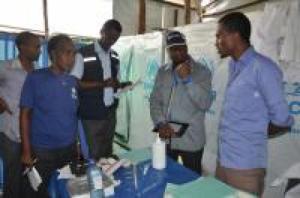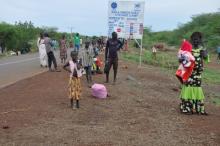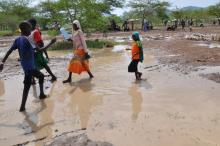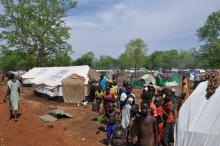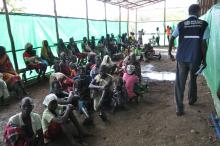WHO Steps Up Efforts to Address the Health Emergency at Kule Refugee Camp in Gambella
More than 124,000 refugees have fled South Sudan to Ethiopia since the outbreak of violence last December and they are staying in four camps in Ethiopia's western Gambella Regional State, run by the Administration for Refugee and Returnee Affairs (ARRA) and UNHCR. At Kule refugee camp, which is fast reaching its capacity of 40,000 refugees, the majority of the refugees are women and children in urgent need of improved medical care and sanitation.
WHO has intensified its efforts to support all stakeholders involved to rapidly address the alarming health conditions at Kule refugee camp. A WHO assessment team led by the WHO Representative and comprising of technical experts in emergency and outbreak response, malaria, water and sanitation, immunization, and communication, evaluated the situation at the camp in April 2014 to enhance WHO technical support. Currently, the camp health center provides emergency medical services to the refugees and is in need of support in strengthening its capacity especially in disease surveillance, medical case management, WASH, and cold chain management.
To rapidly address the health emergency related to the influx of South Sudanese refugees in Gambella, WHO has assigned a refugee crisis response coordinator to support the Gambella Regional Health Bureau. The Coordinator will maximize WHO technical support in the priority areas of intervention identified by the assessment team, linking with ARRA, Federal Ministry of Health, Gambella RHB, UNHCR and other partners, as well as provide support to joint resource mobilization activities. At the moment the inter-agency appeal for the South Sudanese refugee emergency remains dramatically underfunded, with only 14 per cent of the requested US$370 million appeal received. As the number of displaced people continues to rise, the appeal is likely to increase in the coming days.
For more information, please contact: Dr Admas Terefa, Preparedness, Integrated Survaillance and Response Programme Coordinator, WHO Ethiopia; email: admast [at] who.int (admast[at]who[dot]int)
PHOTOS: WHO Ethiopia/ Loza Mesfin Tesfaye



